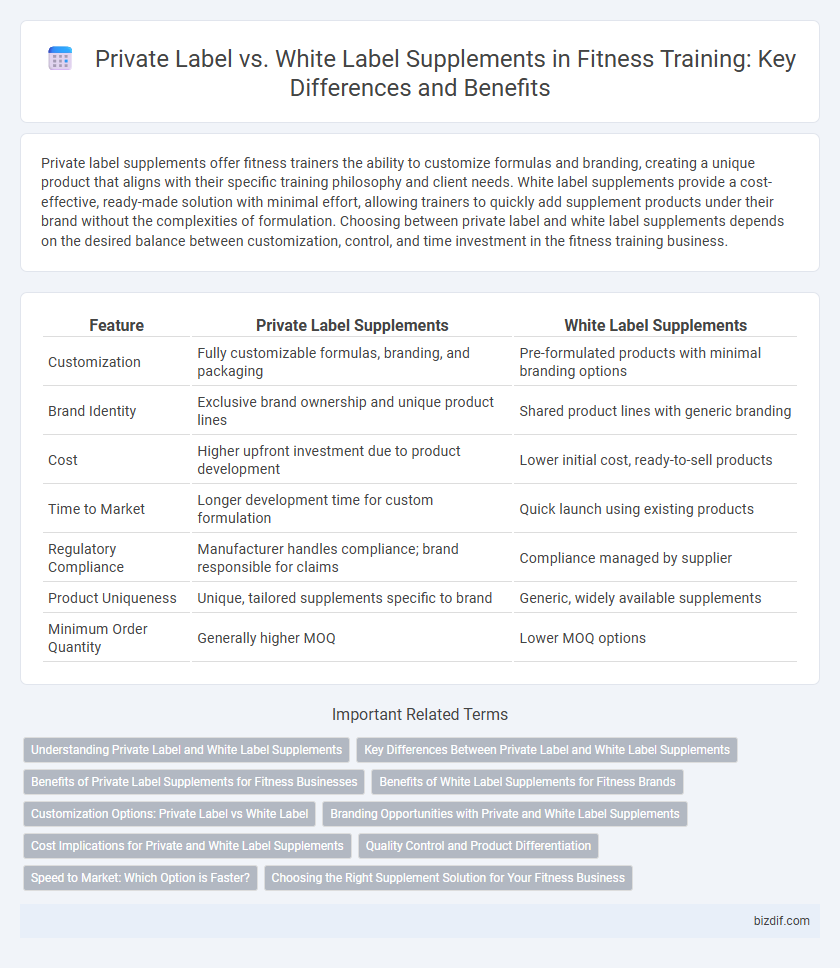Private label supplements offer fitness trainers the ability to customize formulas and branding, creating a unique product that aligns with their specific training philosophy and client needs. White label supplements provide a cost-effective, ready-made solution with minimal effort, allowing trainers to quickly add supplement products under their brand without the complexities of formulation. Choosing between private label and white label supplements depends on the desired balance between customization, control, and time investment in the fitness training business.
Table of Comparison
| Feature | Private Label Supplements | White Label Supplements |
|---|---|---|
| Customization | Fully customizable formulas, branding, and packaging | Pre-formulated products with minimal branding options |
| Brand Identity | Exclusive brand ownership and unique product lines | Shared product lines with generic branding |
| Cost | Higher upfront investment due to product development | Lower initial cost, ready-to-sell products |
| Time to Market | Longer development time for custom formulation | Quick launch using existing products |
| Regulatory Compliance | Manufacturer handles compliance; brand responsible for claims | Compliance managed by supplier |
| Product Uniqueness | Unique, tailored supplements specific to brand | Generic, widely available supplements |
| Minimum Order Quantity | Generally higher MOQ | Lower MOQ options |
Understanding Private Label and White Label Supplements
Private label supplements are custom-formulated products created by manufacturers specifically for a brand, allowing unique ingredients, branding, and packaging, enhancing market differentiation. White label supplements involve pre-made, generic products sold under multiple brands with minimal customization, offering a faster and cost-effective entry to market. Understanding these distinctions helps fitness trainers and businesses choose the best supplement strategy to align with their brand identity and customer needs.
Key Differences Between Private Label and White Label Supplements
Private label supplements are custom-formulated products specifically designed and branded for a single company, offering exclusive control over ingredients, packaging, and branding. White label supplements are pre-manufactured, standardized products sold to multiple businesses under different brand names with limited customization options. Key differences include product exclusivity, formulation control, and branding flexibility, which affect market differentiation and consumer perception in the fitness training industry.
Benefits of Private Label Supplements for Fitness Businesses
Private label supplements offer fitness businesses full control over product formulation, branding, and quality, enabling a unique market position and stronger customer loyalty. Customizable ingredients and packaging differentiate the brand from competitors and increase perceived value among fitness enthusiasts. Exclusive ownership of formulations also allows for premium pricing and long-term customer trust, driving higher profitability.
Benefits of White Label Supplements for Fitness Brands
White label supplements offer fitness brands a cost-effective and time-efficient solution for expanding product lines without the need for extensive research and development. These pre-formulated products allow brands to quickly customize packaging and branding, enhancing market presence and customer loyalty. Leveraging white label supplements reduces manufacturing complexities and regulatory hurdles, enabling faster product launch and increased profit margins in the competitive fitness industry.
Customization Options: Private Label vs White Label
Private label supplements offer extensive customization options, allowing fitness trainers to tailor formulations, branding, and packaging to their specific brand identity and client needs. White label supplements provide limited customization, with pre-formulated products and only minor branding changes such as labels and packaging. Choosing private label supplements supports a unique market presence, while white label supplements enable quicker product launches with standardized offerings.
Branding Opportunities with Private and White Label Supplements
Private label supplements offer fitness trainers and gyms the ability to create unique, fully customizable branding that enhances client loyalty and market differentiation. White label supplements provide a cost-effective solution with pre-formulated products, allowing businesses to quickly enter the market under their brand without extensive R&D. Emphasizing private label options enables comprehensive control over ingredient selection and packaging design, making it ideal for fitness professionals aiming to build a premium, distinct supplement line.
Cost Implications for Private and White Label Supplements
Private label supplements typically require higher upfront investment due to custom formulation, branding, and packaging, resulting in increased production costs compared to white label supplements. White label supplements offer lower cost implications as they involve purchasing pre-made products with minimal customization, enabling faster market entry and reduced financial risk. Businesses seeking unique product differentiation should consider private label options despite higher costs, while those prioritizing budget and speed often prefer white label supplements.
Quality Control and Product Differentiation
Private label supplements offer superior quality control through customized formulation and rigorous testing, ensuring consistency and compliance with industry standards. White label supplements typically provide pre-made, generic products with limited opportunities for customization, which may impact differentiation in the competitive fitness market. Investing in private label options allows fitness brands to create unique, high-quality supplements that resonate with target audiences and build stronger brand loyalty.
Speed to Market: Which Option is Faster?
Private label supplements typically offer faster speed to market than white label supplements because they allow brands to customize formulations and packaging while leveraging pre-existing manufacturing setups. White label supplements often require less customization but can face delays due to limited product variety and factory scheduling constraints. Choosing private label solutions enables fitness brands to quickly launch unique supplements tailored to specific market demands, accelerating brand differentiation and customer acquisition.
Choosing the Right Supplement Solution for Your Fitness Business
Private label supplements offer fitness businesses customized formulations and branding control, enabling differentiation in a competitive market. White label supplements provide a faster, cost-effective solution with pre-formulated products ready for branding but limit customization options. Selecting the right supplement solution depends on your business goals, budget constraints, and desire for product uniqueness to effectively meet your customers' specific fitness needs.
Private Label Supplements vs White Label Supplements Infographic

 bizdif.com
bizdif.com